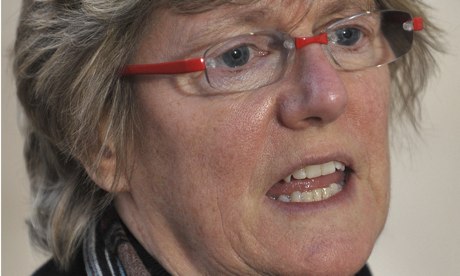
Women who postpone having babies may end up remaining childless because they have left it too late, the government's chief medical officer has warned in comments that reopen the debate about the rise of older motherhood.
"The steady shift to have children later, there are issues with that. We all assume we can have children later but actually we may not be able to," Prof Dame Sally Davies told a debate organised by the Wellbeing of Women charity on Thursday.
Her remarks follow warnings from medical bodies such as the Royal College of Obstetricians and Gynaecologists (RCOG) that women who delay seeking to become mothers until their late 30s and 40s may fail to realise their ambition.
The RCOG on Friday reiterated its advice that women should try to have their children during their "period of optimum fertility" – by the age of 35.
"Biologically, the optimum period for childbearing is between 20 and 35 years of age. Most women will get pregnant. Within a year, 75% of women aged 30 and 66% of women aged 35 will conceive naturally and have a baby. After this, it is increasingly difficult to fall pregnant, and the chance of miscarriage rises," the college said in a statement.
While women may turn to IVF after 35, it may not lead to them having a successful pregnancy, even if they have multiple embryo implantations, the RCOG added.
"Figures show that the live birthrate for women aged less than 35 undergoing IVF is 31%. This rate falls below 5% for women over 42 years of age. In some cases, older women have travelled abroad to countries with lax regulations for IVF treatment, to improve their chances of becoming pregnant by acquiring donor eggs from younger women," it added.
Official figures show that the number of women having a baby over the age of 40 has more than quadrupled in the past 30 years, while the number of those over 35 doing so has also risen sharply.
Davies said she was not necessarily advising women to have children earlier. "It's not for me to tell them what to do," she said. However, she said it was well-known that fertility declined as women aged and "as couples we have to face that".
The pronounced shift towards women leaving it later than before to have a child, often for career or personal reasons, has prompted concern that such women, especially those over 40, are at greater risk of negative outcomes, such as having a miscarriage or stillbirth.
"Most pregnancies will result in a healthy baby. However, adverse pregnancy outcomes also rise with age, and women over 40 are considered to be at a higher risk of pregnancy complications. For these reasons, the RCOG and doctors would encourage women to consider having families during the period of optimum fertility," the college said.
Davies also referred to the growing number of women who are remaining childless, which is now around one in five. "Many more women" are now "choosing not to have any children", said Davies, who said she had been lucky to have two children in her 40s.
However, Siobhan Freegard of the mothers' social networking site Netmums said that many women had children in their 40s without complications. And Nakita Halil of the Family Planning Association said that women not conceiving was not always simply a result of their age. About one in seven couples face fertility problems.
A Department of Health spokesperson said: "It is a well-known fact that fertility declines as women get older. The chief medical officer was commenting on this issue and that women need to be aware of these facts."

